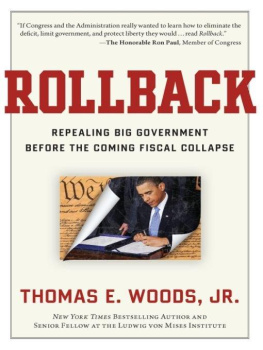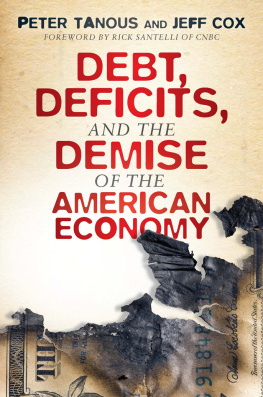Table of Contents
To Heather
There is no doubt that the real destroyer of the liberties of any people is he who spreads among them bounties, donations and largesse.
Plutarch
The more corrupt the State, the more numerous the laws.
Tacitus
CHAPTER 1
Is It Already Too Late?
N obody trusts the government, pollsters tell us. In April 2010, the Pew Research Center found that only 22 percent of Americans polled said they trusted the government at least most of the time.
I wish I believed it. Most Americans seem to have a childlike confidence in government. They may be skeptical of the politician who insists hes been faithful to his wife, but they buy all the major claims government makes for itself. And although they know the governments finances can be dicey, they seem to console themselves that the experts are in charge, and that somehow everything will work out. Few entertain even the possibility of any sort of general collapse or default.
This confidence is about to be severely shaken. A systemic crisis is poised to strike an unprepared America, as the federal government is forced to renege on its impossible promises. It will no longer be the godlike dispenser of bounties, the miracle worker that summons bread from stones.
For even if (1) the robust economic recovery Americans have been waiting for finally arrives, (2) the federal debt becomes manageable, and (3) the nearly $1 trillion in annual interest payments on that debta permanent part of the federal budget within ten yearsis a price Americans are willing to pay, were still sunk. The federal entitlement programs on which generations of Americans have been taught to rely and to base their expectations for retirement will go bust in our lifetimes. The aging of the population guarantees it. The resources do not and will not exist to make good on these promises.
Most of the people reading this book will live through one of the most significant periods of change in American history. The scale of the coming, inevitable spending cuts will be unlike anything Americans have ever experienced during peacetime. Americans have never seen federal spending scaled back. Even when the newspapers speak of budget cuts, they dont actually mean the budget will be lower than it was the previous year. They mean only that its rate of growth is falling. Government is never cut. But it will be.
Between now and the entitlement collapse, our representatives in government will keep trying to kick the can down the road. They will buy time with marginal reforms in the programs involved. When that time runs out, theyll try the same thing again. With default staring them in the face, they will try tax increases. They will try borrowing. They will try printing the money. None of these approaches will work, as I intend to show, though if employed vigorously enough they just might wreck the economy, including the dollar itself.
But in crisis there is opportunity.
Former White House Chief of Staff Rahm Emanuel, who notoriously observed that a crisis should never be allowed to go to waste, was on to something. Though his meaning was clear enoughthat government should exploit crisis situations to ram through the laundry list of programs that would be politically prohibitive during times of calmhe arrived at the wrong conclusion. The coming fiscal crisis is an opportunity to take a careful second look at government, its claims, and its promises, and to see how much of it holds up to the harsh light of reason. Forget the comic-book rendition of government achievements we were all taught in sixth grade. This book paints a far different picture. And with that picture in mind, the unavoidable slashing of the federal budget that will have to take place is cast in rather a different light. Instead of a regrettable exercise undertaken out of grim necessity, it will be an enormous stride forward into a much brighter future.
The critical first step for checking the seemingly unstoppable federal advance is to stick a dagger through the heart of the myths by which government has secured the confidence and consent of the people. We know these myths by heart. Government acts on behalf of the public good. It keeps us safe. It protects us against monopolies. Without it, America would be populated by illiterates, half of us would be dead from quack medicine or exploding consumer products, and the other half would lead a feudal existence under the iron fist of private firms that worked us to the bone for a dollar a week.
But lets suppose that the federal government has in fact been an enemy of the peoples welfare, and that the progress in our living standards has occurred in spite of its efforts. It pits individuals, firms, industries, regions, races, and age groups against each other in a zero-sum game of mutual plunder. It takes credit for improvements in material conditions that we in fact owe to the private sector, while refusing to accept responsibility for the countless failures and social ills to which its own programs have given rise. Rather than bringing about the public good, whatever that means, it rules over us through a series of fiefdoms seeking bigger budgets and more power. Despite the veneer of public-interest rhetoric by which it hides its real nature, it is a mere parasite on productive activity and a net minus in the story of human welfare.
Now if this is a more accurate depiction of the federal government, and I intend to argue that it is, we are likely to have a different view of the consequences of the coming fiscal collapse. So an institution that has seized our wealth, held back the rise in our standard of living, and deceived schoolchildren into honoring it as the source of all progress, will have to be cut back? Whats the catch? This is no calamity to be deplored. It is an opportunity to be seized. Still another purpose of this book, therefore, is to demonstrate that we would not only survive but even flourish in the absence of countless institutions we are routinely told we could not live without.
Americans have given government the benefit of the doubt because they have thoughtlessly accepted a schoolboy narrative of how much worse off we would all be without it. If the coming disaster is to be averted and future crises prevented from arising, the smiley-face version of government we learned in junior high needs to be dismantled and discarded forever. Chapter 4, for instance, spends some time discussing portions of the federal regulatory apparatus. It does so not because the regulatory agencies are themselves particularly expensive (their indirect costs on the private sector are another matter), but because they form a significant part of the mythological edifice that gives rise to the publics nave confidence in government.
In speaking of averting the coming disaster, we cant fool ourselves into believing pain can be avoided. That horse has already left the stable. The federal government has made it impossible for us to escape unscathed. The only way to prevent the outright collapse on the horizon, a collapse that would surely be followed by emergency government policies that could destroy the dollar and with it the fortunes of the people, is by making severe cuts in the present. Some of these, as this book will argue, will be easy, and in spite of the predictable caterwauling by the interest groups involved, Americans would hardly notice them. Others will be more difficult, particularly since they will need to be so substantial and sudden. The best we can hope for is to endure some pain now in order to avoid a systemic crisis later. The more we can do in the present, the less severe will be the problem in the future, and the less likely our public servants will be to wipe Americans out completely in the course of trying to overcome it.










